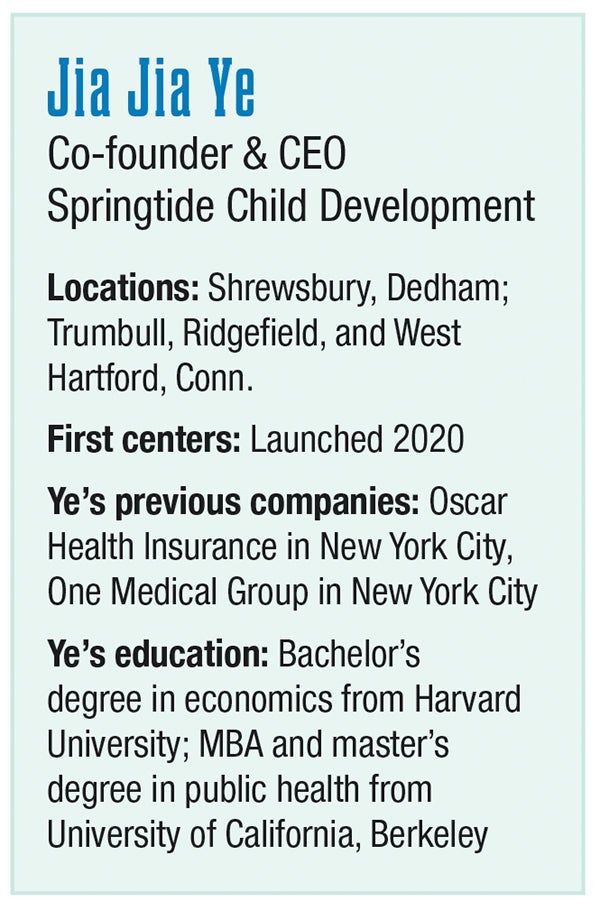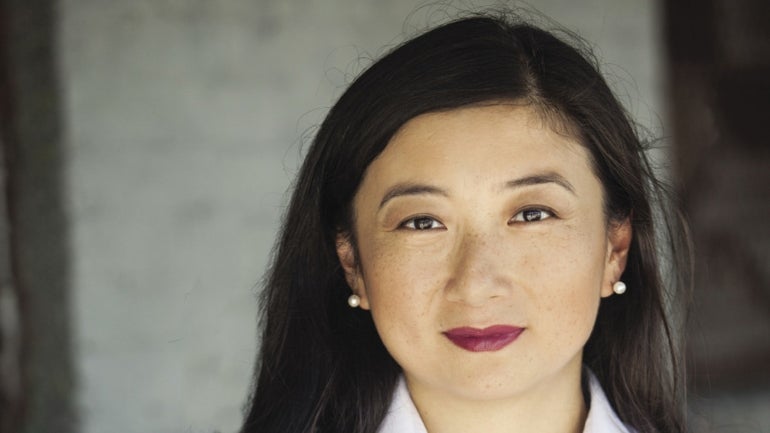Jia Jia Ye is looking to redefine treatment for children on the autism spectrum. The co-founder and CEO of Springtide Child Development, Ye attended the April 23 opening of the care center’s newest location in Shrewsbury, one of two locations opened in Massachusetts.Give a little bit about your background, and what made you get into […]
Get Instant Access to This Article
Subscribe to Worcester Business Journal and get immediate access to all of our subscriber-only content and much more.
- Critical Central Massachusetts business news updated daily.
- Immediate access to all subscriber-only content on our website.
- Bi-weekly print or digital editions of our award-winning publication.
- Special bonus issues like the WBJ Book of Lists.
- Exclusive ticket prize draws for our in-person events.
Click here to purchase a paywall bypass link for this article.
Jia Jia Ye is looking to redefine treatment for children on the autism spectrum. The co-founder and CEO of Springtide Child Development, Ye attended the April 23 opening of the care center’s newest location in Shrewsbury, one of two locations opened in Massachusetts.

Give a little bit about your background, and what made you get into the healthcare field.
I've been in health care for about 20 years. When I was a lot younger, I started thinking I was going to be a physician, and then pretty soon what I realized was I loved thinking about health care in a more sort of scaled, systematic way. I started off first in the finance world, always focused on healthcare clients and then moved over to building really innovative healthcare companies around 2010.
For me, my personal passion is around creating great customer experiences in health care. This comes from initially wanting to be a doctor, seeing how people get a ton of value from going through the healthcare system, but the experience is really horrible. It's amazing what clinicians are able to do day to day, to serve others and to help people, but most people come away feeling confused, come away feeling scared, feeling like there's a huge cost burden they don't understand. They’re tossed between one provider to their insurance company to the lab, so it's just incredibly stressful overall for people.
That's the thing that's always been driving me within health care, because what clinicians do is super amazing. What I'm passionate about is creating that experience allowing customers to actually enjoy all the great things they get from the healthcare system.
How did Springtide come about?
We started Springtide about two years ago, first in Connecticut, and my first encounter with autism actually was when I was a kid. I grew up in Salt Lake City, Utah, and at the time, there were literally zero therapists in the entire state. We had a very close family friend who had a kid with autism, and I remember distinctly how overwhelming it was, how much work it required. They would fly their therapist from Boston to Salt Lake City every single month for therapy, and it was really impactful.
My whole career, I thought this is where I want to go. But it was recently when I started to look back into autism, and I discovered that even though so much progress has been made, you can find therapists, but parents still wait six months to a year to access care. It's still incredibly expensive and confusing. And they often don't know where to go for care. It reminded me of all these things that Utah family had experienced. That was what really inspired me to start this and to really focus on thinking about this from the family experience.
Are the behavioral methods you use at Springtide different from what is traditionally done for children on the autism spectrum?
The first thing that folks will experience when it comes to Springtide that we do really differently is we focus on the entire kid, so a 360 kind of perspective around that kid. A lot of times when kids will go into therapy, they'll get really point solutions. They may go to an applied behavioral analysis therapist or a speech therapist or an occupational therapist or they'll go to their gastrointestinal doctor, and everyone is really focused on just one narrow sliver of it.
This is really tough because kids with autism have huge, sort of complicated, intricately woven conditions that impact each other, so kids with autism tend to have very high rates of medical conditions like neurology, sleeping, and feeding issues. They tend to have very high mental health conditions as well and very high neurobiological conditions. And so all of these things actually come into play in who that child is and understanding the best way to work with that child to get great outcomes.
The other thing different in our practice is that we're really focused on working with the families to achieve the goals that they really want. Often when you work with the therapist, they're really focused on what the therapy is doing, how effective it is, and that's great. Therapists really care about the effectiveness of their therapy with a child.
We also talk a lot about zooming out and looking at where the family wants to go and where the goals are for the kid. If the family's goals are to help that child get back into the school system, to be integrated with their peers of their same age, we think about that, and we really plan our therapy with that kind of goal in mind. Versus just being in the moment around how to do potty training or feeding or certain skill sets. We don't really approach it that way. With the family, we are making sure we always have that long-term goal in mind and work toward that.
Are there other plans to eventually expand further in Massachusetts?
We've been hearing from folks there are access gaps in various pockets throughout the state. It's definitely a really important state for us. Massachusetts is one that is really progressive in its thinking around autism, and we're excited to expand more in the state.
This interview was conducted and edited for length and clarity by WBJ Staff Writer Alexander MacDougall.

